"Cherishing Little Steps - A Haven for Baby and Family Journeys"
Nutrient-Rich Foods for Breastfeeding Moms
As a breastfeeding mom, you strive to nourish your little one while also taking care of yourself. Have you considered the power of incorporating a variety of nutrient-rich foods into your diet to support both your well-being and your baby's development? From leafy greens to omega-3 rich foods, there's a world of delicious options waiting to provide you with the essential vitamins and minerals needed during this special time. Ready to discover how these foods can elevate your breastfeeding journey to new heights of health and vitality?
Leafy Greens
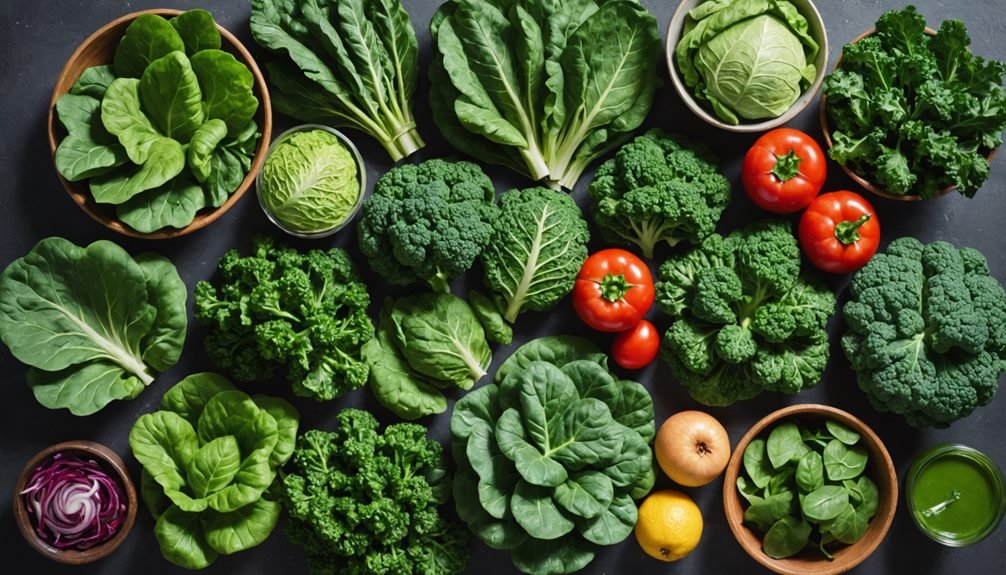
Leafy greens are a powerhouse of nutrients for breastfeeding moms. Including a variety of leafy greens in your diet can offer a multitude of benefits.
Spinach, kale, Swiss chard, and collard greens are rich in vitamins A, C, and K, as well as iron and calcium. These nutrients are crucial for both you and your baby's health.
Meal planning plays a vital role in ensuring you consume a diverse range of leafy greens. Incorporating them into salads, smoothies, soups, and stir-fries can add a delicious and nutritious touch to your meals.
Planning ahead by pre-washing and chopping leafy greens can make meal prep easier and more convenient, especially during busy days with a newborn.
Lean Protein
Rich in essential nutrients, lean protein is a key component of a well-rounded diet for breastfeeding moms. Lean protein sources such as skinless poultry, fish, lean cuts of beef or pork, tofu, legumes, and low-fat dairy products provide a variety of benefits for both you and your little one.
Here's a quick breakdown of the benefits of incorporating lean protein into your diet:
| Benefits of Lean Protein | Protein Sources |
|---|---|
| Supports tissue repair | Skinless poultry |
| Promotes muscle strength | Fish |
| Aids in postpartum recovery | Lean cuts of beef or pork |
| Helps with satiety | Tofu, legumes, low-fat dairy |
Including lean protein in your meals can assist in maintaining your energy levels, supporting your body's healing process postpartum, and ensuring that you are adequately nourished while breastfeeding. Aim to incorporate a variety of these protein sources into your meals to reap the benefits they offer.
Whole Grains
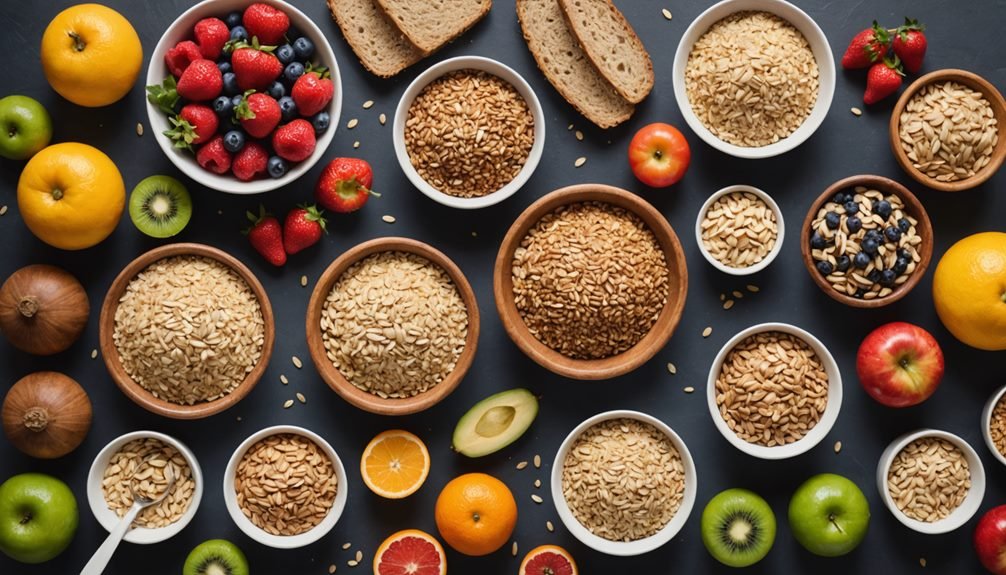
Including a variety of whole grains in your diet can provide essential nutrients and energy for both you and your baby during the breastfeeding period. Whole grains are an excellent source of fiber, vitamins, and minerals that can support your overall health and well-being.
When choosing whole grains, keep in mind the benefits they offer and any concerns related to gluten intake:
- Fiber benefits: Whole grains like oats, quinoa, and brown rice are rich in fiber, which can aid in digestion and help prevent constipation, a common issue for many breastfeeding moms.
- Gluten concerns: If you have celiac disease or a gluten intolerance, opt for gluten-free whole grains such as amaranth, buckwheat, and millet to avoid any adverse reactions.
- Nutrient-rich options: Whole wheat, barley, and bulgur are packed with essential nutrients like iron, B vitamins, and antioxidants that can benefit both you and your baby.
- Energy boost: Whole grains provide a steady release of energy, keeping you fueled throughout the day and supporting your milk production.
Healthy Fats
To continue supporting your health and your baby's development while breastfeeding, incorporating healthy fats into your diet is key. Avocados are a fantastic source of healthy fats, containing monounsaturated fats that are beneficial for heart health. They're also rich in fiber, vitamins, and minerals, providing you with a well-rounded nutrient boost. Adding avocado to salads, smoothies, or spreading it on whole grain toast can be a delicious way to incorporate this nutritious fruit into your meals.
Another great option is coconut oil, known for its unique blend of fatty acids that can support brain function and energy levels. Coconut oil has antimicrobial properties that may benefit your immune system and can even aid in weight management. Use coconut oil in cooking or baking as a healthier alternative to other oils or butter.
Including these healthy fats in your diet can enhance both your well-being and your baby's growth during the breastfeeding journey.
Colorful Fruits
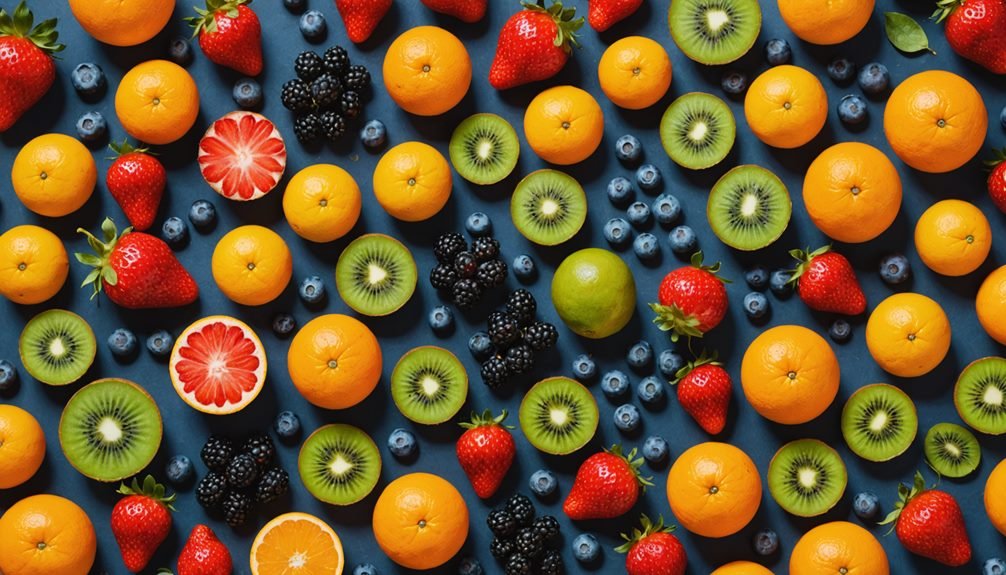
For a well-rounded and nutrient-dense diet while breastfeeding, incorporating a variety of colorful fruits is essential. Colorful fruits offer a plethora of health benefits for both you and your baby. Here are some reasons why these fruits are a must-have in your diet:
- Antioxidant Benefits: Colorful fruits like berries, oranges, and kiwis are rich in antioxidants, which help protect your cells from damage caused by free radicals.
- Immune Support: Fruits such as mangoes, papayas, and watermelon are packed with essential vitamins and minerals that can boost your immune system, keeping you and your baby healthy.
- Variety of Nutrients: Each color in fruits represents different nutrients. By consuming a variety of colorful fruits, you ensure you're getting a wide range of essential vitamins and minerals.
- Hydration: Many colorful fruits have high water content, aiding in keeping you well-hydrated, especially during the demanding breastfeeding period.
Including a rainbow of fruits in your diet won't only bring vibrancy to your meals but also provide you and your little one with essential nutrients for overall well-being.
Dairy Products
Dairy products are a valuable component of a breastfeeding mother's diet, providing essential nutrients that support both your health and your baby's development. They're rich in calcium, a vital mineral for maintaining bone health and muscle function for both you and your little one. Opt for low-fat or fat-free options like milk, yogurt, and cheese to keep your saturated fat intake in check.
If you're lactose intolerant, try lactose-free milk or dairy alternatives fortified with calcium, such as almond milk or soy yogurt.
Calcium sources in dairy products are crucial for preventing deficiencies that can affect bone density and overall health. Consuming adequate calcium is especially important during breastfeeding to support your own bone health, as your body may transfer calcium to your baby through breast milk. If you experience lactose intolerance symptoms like bloating or gas, consult your healthcare provider for guidance on alternative calcium sources or lactase enzyme supplements to aid in digestion.
Nuts and Seeds
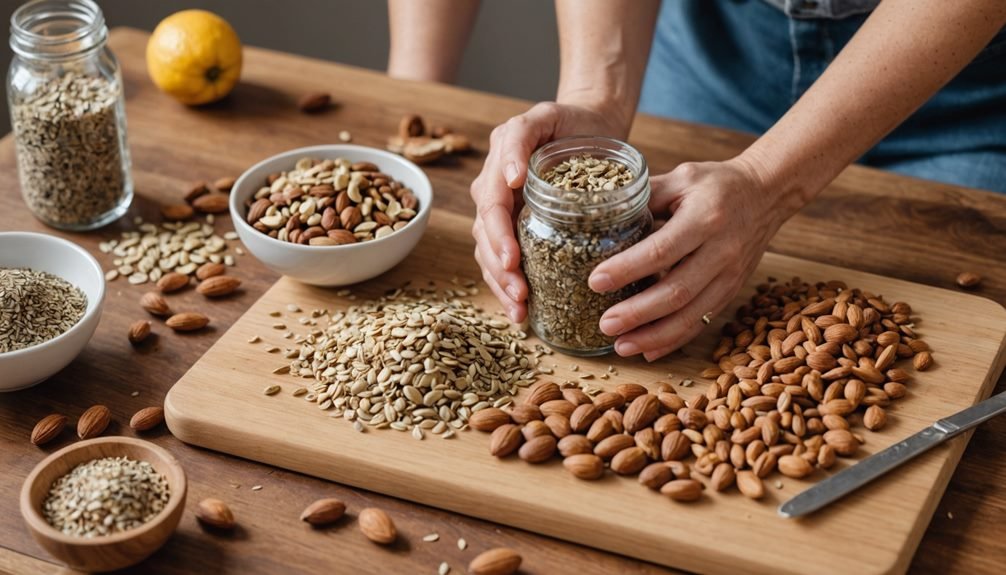
Considering the nutrient-rich composition necessary for your breastfeeding journey, let's now direct our focus towards nuts and seeds. These nutrient-packed snacks and energy-boosting recipes can be a valuable addition to your diet:
- Almonds: Rich in vitamin E and healthy fats, almonds make a convenient and nourishing snack that can help support your energy levels throughout the day.
- Chia Seeds: Packed with omega-3 fatty acids and fiber, chia seeds can be easily incorporated into smoothies, yogurt, or oatmeal for a nutrient boost.
- Walnuts: High in antioxidants and plant-based omega-3s, walnuts are a great choice for maintaining brain health and providing lasting energy.
- Flaxseeds: A good source of lignans and fiber, flaxseeds can be ground and added to baked goods or sprinkled over salads for an extra nutritional punch.
Legumes
With their array of essential nutrients and versatility in culinary applications, legumes stand out as a significant component of a breastfeeding mother's diet. Legumes, including beans, lentils, and chickpeas, are packed with protein, fiber, iron, and folate, all crucial for postpartum recovery and milk production. Incorporating legumes into your meals can provide you with sustained energy and help meet your increased nutrient needs during breastfeeding.
Legumes offer numerous benefits for breastfeeding moms. They aren't only nutrient-dense but also cost-effective and easy to prepare. Legumes can be used in various dishes, from salads to soups to stews, adding a hearty and satisfying element to your meals.
Additionally, legume recipes can be customized to suit your taste preferences, making them a versatile and delicious addition to your diet.
Try experimenting with different legume recipes, such as a hearty lentil soup, a flavorful bean salad, or a creamy hummus dip. By including legumes in your diet, you can nourish your body and support your breastfeeding journey with wholesome and delicious foods.
Omega-3 Rich Foods
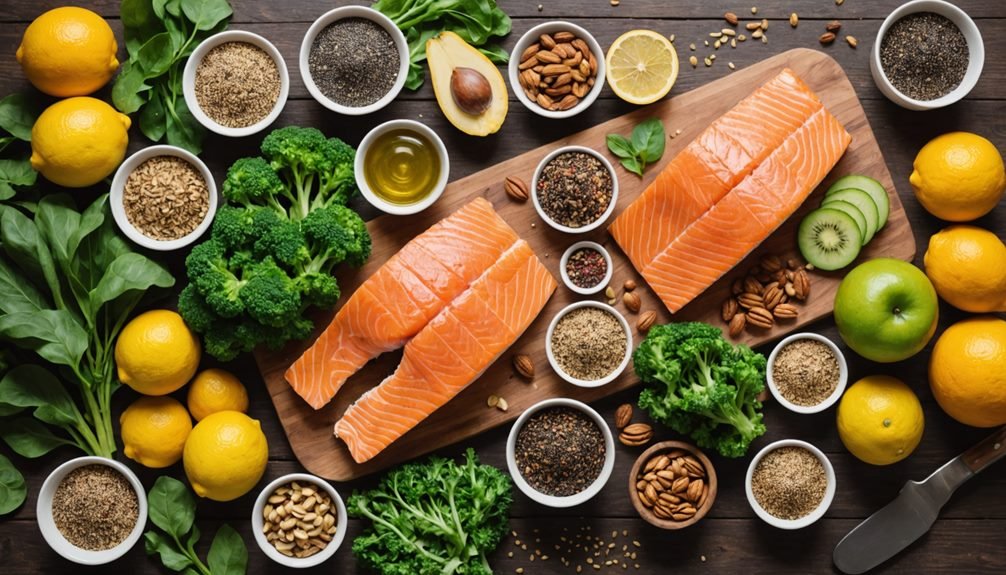
Rich in essential fatty acids like DHA and EPA, omega-3 rich foods play a vital role in supporting the overall health and well-being of breastfeeding mothers. Including these foods in your diet can't only benefit you but also provide essential nutrients for your baby's development. Here are some key points to consider:
- Fish oil supplements: These can be a convenient way to ensure an adequate intake of omega-3 fatty acids, but it's essential to consult with your healthcare provider to determine the right dosage and ensure safety for you and your baby.
- Benefits and risks: Omega-3 fatty acids have been linked to various health benefits such as reducing inflammation and supporting heart health. However, excessive intake can have potential risks, so moderation is key.
- DHA sources: Fatty fish like salmon, mackerel, and sardines are excellent natural sources of DHA, crucial for your baby's brain development.
- Importance for baby's brain development: DHA is a critical component for brain growth and cognitive function in infants, making it vital for their overall development.
Hydrating Beverages
Hydrating beverages are essential for maintaining optimal hydration levels, especially for breastfeeding mothers. Staying well-hydrated is crucial for milk production and overall health. Remember, your body's water needs increase during lactation, so it's important to prioritize your hydration. Here are some hydration tips and beverages to keep you feeling refreshed:
| Hydration Tips | Beverages |
|---|---|
| Drink water throughout the day | Electrolyte drinks can help replenish minerals lost through breastfeeding. |
| Carry a water bottle with you | Herbal teas like chamomile or fenugreek can provide hydration and relaxation. |
| Flavor water with fruits | Regular intake of water is vital to maintain hydration levels. |
| Limit caffeine intake | Coconut water is a natural source of electrolytes and can aid in hydration. |
| Monitor urine color for hydration status | Homemade smoothies with water-rich fruits like watermelon can contribute to your daily water intake. |
Frequently Asked Questions
Can Certain Foods in My Diet Affect My Baby's Milk Supply?
Certain foods can impact your baby's milk supply. Factors like nutrient absorption and hydration levels play a role. It's essential to maintain a balanced diet rich in vitamins and minerals to support lactation.
Hydrate adequately and include foods like oatmeal, leafy greens, and lean proteins. Remember, your body needs nourishment to produce quality breast milk for your little one. Prioritize your diet to benefit both you and your baby's health.
Are There Any Foods That Breastfeeding Moms Should Avoid?
Certain foods can impact breastfeeding, like dairy if your baby has a sensitivity. Be mindful of your caffeine intake as it can affect your little one. It's wise to avoid foods that may cause discomfort or unwanted reactions in your baby.
Pay attention to your diet's effects on your baby's well-being and adjust accordingly. Consulting a healthcare provider can offer personalized guidance for a healthy breastfeeding journey.
How Can I Maintain a Balanced Diet While Breastfeeding?
To maintain a balanced diet while breastfeeding, focus on meal planning. Include a variety of fruits, veggies, whole grains, and lean proteins.
Hydration is crucial, so drink plenty of water throughout the day. Opt for nutrient-dense snacks like nuts or yogurt to keep energy levels up.
Are There Specific Foods That Can Help With Postpartum Recovery?
To aid in postpartum recovery, focus on superfoods rich in key nutrients. Include lean proteins like chicken, beans, and fish to support healing. Incorporate whole grains, fruits, and veggies for energy and fiber. Don't forget healthy fats from avocados and nuts. Hydrate with plenty of water and herbal teas. Prioritize self-care and nourishing foods to help your body recover efficiently during this crucial time.
Can I Still Enjoy Occasional Treats While Breastfeeding?
Just like a sweet breeze on a warm day, indulging occasionally is totally fine while breastfeeding. Balancing treats with healthy snacking options is key. Opt for nutrient-rich choices most of the time, but don't stress about the occasional indulgence.
Conclusion
Congratulations on making nutrient-rich food choices for your breastfeeding journey! By incorporating leafy greens, lean proteins, whole grains, healthy fats, colorful fruits, nuts, seeds, legumes, omega-3 rich foods, and hydrating beverages into your diet, you are providing both yourself and your baby with essential nutrients for optimal health and development. Keep up the great work and enjoy the benefits of a well-nourished body and mind during this special time.




